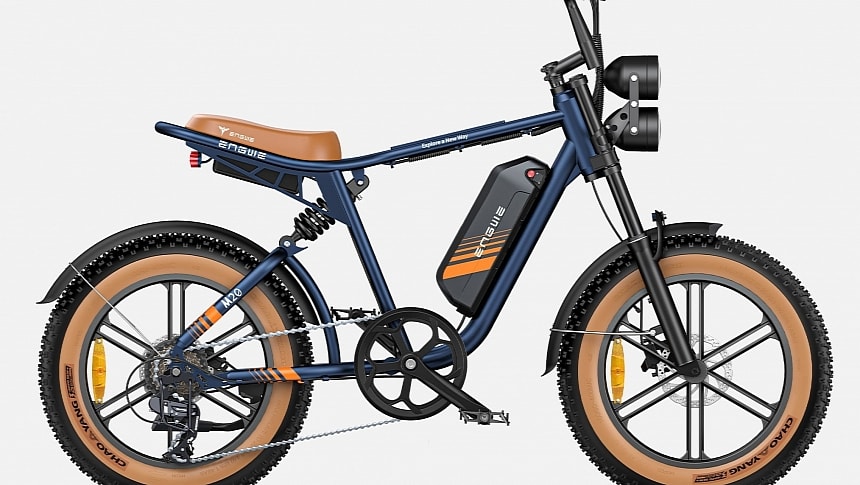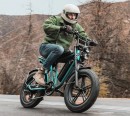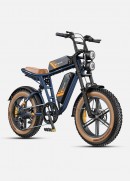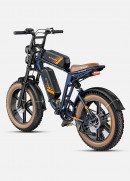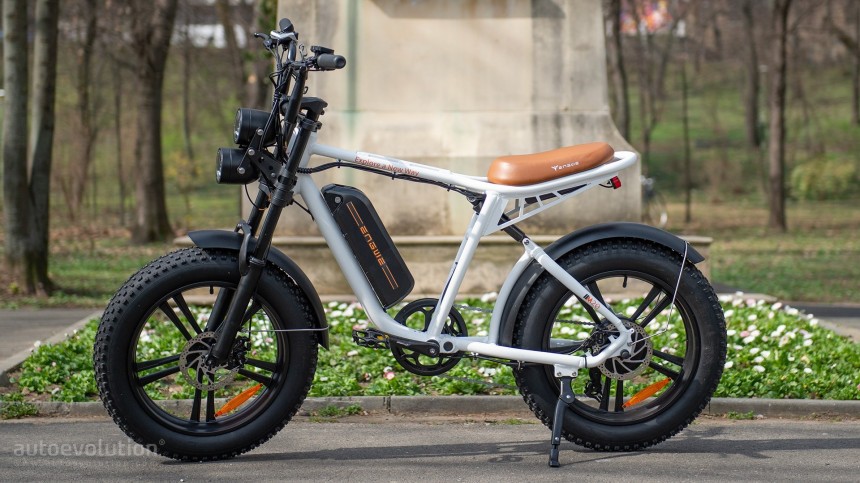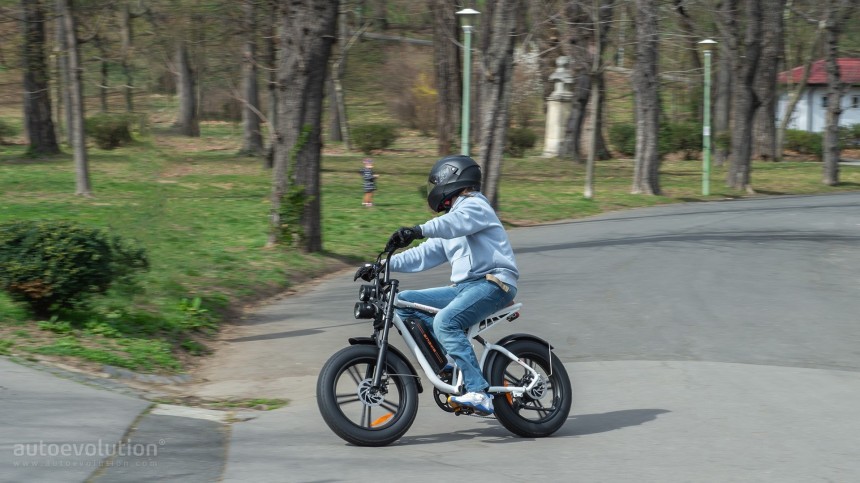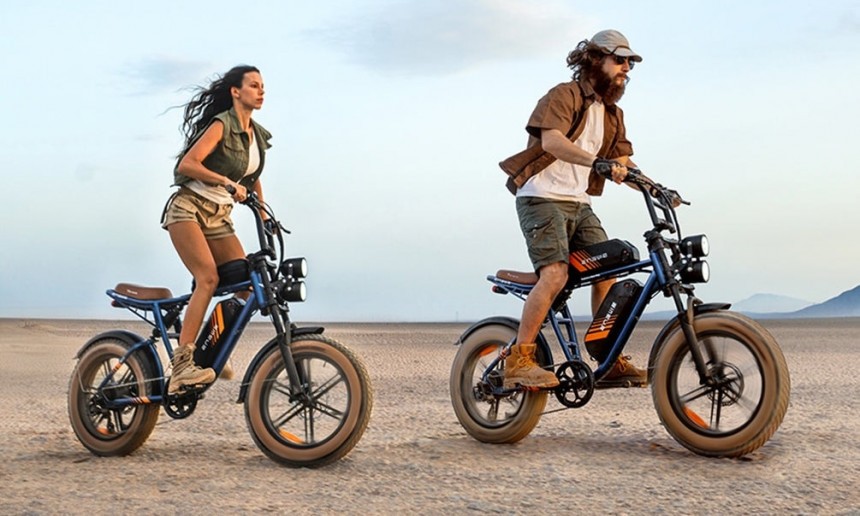A while back, we heard about Engwe and their M20 cafe-racer-inspired e-bike. Well, now it's back and better than before. This is the M20 2.0's story and why it's now an even more feasible solution to your urban mobility needs.
Folks, the name Engwe has been seen on our pages before. Heck, you might have even seen some of their machines on city streets already—I know I have. That said, I recently received word from this crew that they took their already-loved M20 e-bike and modified it to be even better than ever.
First and foremost, be sure to check out the stats revolving around the previous generation M20, and once you do, come back to the 2.0 to spot the differences. If you don't have time, I'll help you out with around 800 words or so.
Now, whenever I talk about an e-bike, I like to start with the frame design. After all, it's the backbone of any bicycle and the defining factor in what sort of terrain you should be riding on. Well, both M20s feature a full-suspension frame, but there was a bit of a problem with the first generation that the second seems to have solved.
In our review of the M20, we realized that the saddle sat rather low to the ground, thus putting strain on the knees as you pedal. Well, the 2.0 appears to have solved that issue by raising the saddle a bit, ensuring two things: comfort and the ability to direct power into the crank much more efficiently. Good job on this one, Engwe.
I mentioned that the 2.0 sports a full-suspension frame, and this means a rear shock underneath the saddle with 40 mm of travel, and a front fork with 50 mm of travel. It's not the sort of setup needed for downhill tracks or heavy off-road use, but then again, it's not made for that.
Sure, it'll handle a dirt and gravel road and even a ride through some grassy field, maybe even some messing around on a very light trail, but the M20's natural habitat is in an urban setting. Nonetheless, there are plenty of first-generation M20 owners who have transformed their EVs into on-trail machines day in and day out.
Part of what makes all this possible is the presence of fat tires (4-inch cross-section) strapped to the 2.0, a trait that accompanies quite a number of Engwe e-bikes. They're knobby, they're grippy, and above all, provide a bit more cushioning as you hit bumps and debris riding around. With the right pressure and right terrain, you can consider this feature as a sort of third suspension.
Now, here's where things get wild. Overall, Engwe straps a rear hub-mounted motor to the M20 2.0, which rocks 750 W of nominal power and peaks at 1,200 W. Moreover, this powerhouse spits out a generous 75 Nm (55 lb-ft) of torque, so it is clearly much more powerful than the previous generation and bound to bring a smile to new riders' faces.
In terms of speed, the 2.0 is also unlocked to a full Level 3 e-bike, able of attaining a top speed of 28 mph (45 kph US Version), and even equipped with throttle function. The latter ties into battery capacity, which, according to Engwe, is a whopping 31.2 Ah of juice with the two-battery version.
What this means in terms of range, well, under throttle-only functionality, Engwe states that the 2.0 can reach a max range of 63 miles (101 km). That's pretty good, and if you're planning on pedaling as well, a peak of 162 miles (261 km) can be achieved. Clearly, these numbers are under ideal and test conditions, but that's still more than enough for daily rides.
Another upgrade we see on the 2.0 is the hydraulic braking system. Typically, Engwe and countless other e-bike manufacturers throw on mechanical brakes on their bikes, mainly as a way to keep pricing at a minimum, but as we can see here, this manufacturer has decided to throw a bit more cash at the 2.0 and bring its safety and control standards up a bit. Head and taillights also accompany the mix,
I'm happy about this one, and funny enough, these upgrades didn't affect the M20 2.0's pricing too much. For starters, Engwe's website shows off a starting price of $1,100 (€1,030 at current exchange rates) for a single-battery 2.0, and with two batteries, that price only goes up to $1,300, so well within that $2,000 price ceiling, most new e-bike riders are looking to stay under. Oh, allow me to also point out that Engwe has an Early Bird offer on this one, so check them out.
Once you add an LED display, an 8-speed Shimano drivetrain, and all the other bells and whistles needed to complete a bicycle, the M20 2.0 weighs 88.6 lbs (40 kg). So you won't be taking this up a flight or two of stairs, but rather unload the batteries and bring them into your home. Just a little something to consider if you're in the market for a new e-bike.
First and foremost, be sure to check out the stats revolving around the previous generation M20, and once you do, come back to the 2.0 to spot the differences. If you don't have time, I'll help you out with around 800 words or so.
Now, whenever I talk about an e-bike, I like to start with the frame design. After all, it's the backbone of any bicycle and the defining factor in what sort of terrain you should be riding on. Well, both M20s feature a full-suspension frame, but there was a bit of a problem with the first generation that the second seems to have solved.
I mentioned that the 2.0 sports a full-suspension frame, and this means a rear shock underneath the saddle with 40 mm of travel, and a front fork with 50 mm of travel. It's not the sort of setup needed for downhill tracks or heavy off-road use, but then again, it's not made for that.
Sure, it'll handle a dirt and gravel road and even a ride through some grassy field, maybe even some messing around on a very light trail, but the M20's natural habitat is in an urban setting. Nonetheless, there are plenty of first-generation M20 owners who have transformed their EVs into on-trail machines day in and day out.
Part of what makes all this possible is the presence of fat tires (4-inch cross-section) strapped to the 2.0, a trait that accompanies quite a number of Engwe e-bikes. They're knobby, they're grippy, and above all, provide a bit more cushioning as you hit bumps and debris riding around. With the right pressure and right terrain, you can consider this feature as a sort of third suspension.
In terms of speed, the 2.0 is also unlocked to a full Level 3 e-bike, able of attaining a top speed of 28 mph (45 kph US Version), and even equipped with throttle function. The latter ties into battery capacity, which, according to Engwe, is a whopping 31.2 Ah of juice with the two-battery version.
What this means in terms of range, well, under throttle-only functionality, Engwe states that the 2.0 can reach a max range of 63 miles (101 km). That's pretty good, and if you're planning on pedaling as well, a peak of 162 miles (261 km) can be achieved. Clearly, these numbers are under ideal and test conditions, but that's still more than enough for daily rides.
I'm happy about this one, and funny enough, these upgrades didn't affect the M20 2.0's pricing too much. For starters, Engwe's website shows off a starting price of $1,100 (€1,030 at current exchange rates) for a single-battery 2.0, and with two batteries, that price only goes up to $1,300, so well within that $2,000 price ceiling, most new e-bike riders are looking to stay under. Oh, allow me to also point out that Engwe has an Early Bird offer on this one, so check them out.
Once you add an LED display, an 8-speed Shimano drivetrain, and all the other bells and whistles needed to complete a bicycle, the M20 2.0 weighs 88.6 lbs (40 kg). So you won't be taking this up a flight or two of stairs, but rather unload the batteries and bring them into your home. Just a little something to consider if you're in the market for a new e-bike.
